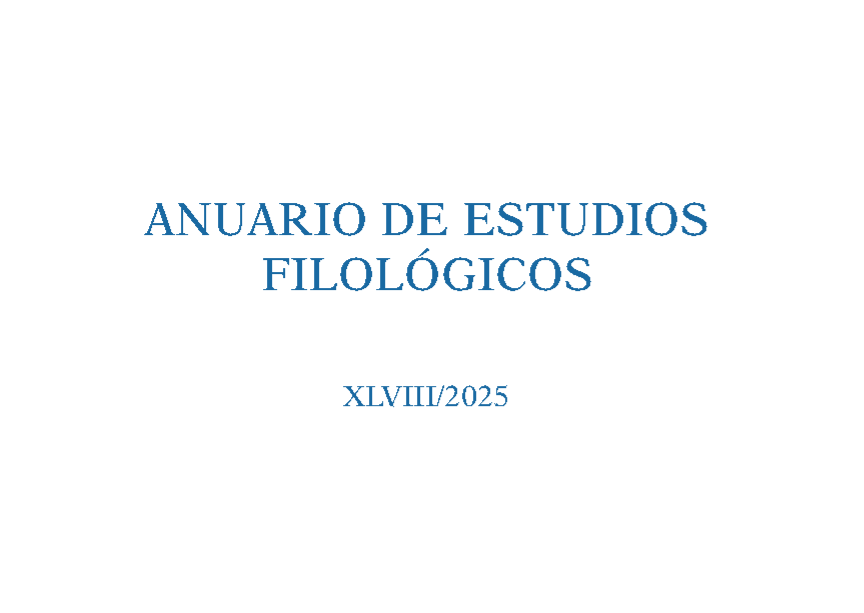Kurtz de Heart of Darkness (1899) como arquetipo del colonizador: liminalidad, trauma, fantasma, violencia y ritual
DOI:
https://doi.org/10.17398/2660-7301.48.261Palabras clave:
Colonialismo, Liminalidad, Trauma, Fantasma, Violencia, RitualResumen
El presente artículo analiza la figura del comerciante de marfil Kurtz de la obra de Joseph Conrad Heart of Darkness (1899). Esta narración es una obra canónica dentro de las representaciones culturales occidentales del universo colonial y el personaje de Kurtz sirve como arquetipo del colonizador en las obras literarias posteriores. La relación de interdependencia e interconexión entre universo colonial y universo de la metrópolis establecida por Conrad permite que el análisis de esta figura ofrezca también detalles que sirven para comprender la figura del perpetrador de crímenes de masas de los regímenes totalitarios del siglo XX. El artículo se focaliza en aspectos culturales, psicológicos, sociales, antropológicos y políticos relacionados con la colonia y el colonizador como la liminalidad, la animalidad, el trauma, la fantasmalidad, la herencia, los entierros, la violencia y los rituales.
Descargas
Referencias
ACHEBE, Chinua (2006): «An Image of Africa: Racism in Conrad’s Heart of Darkness». En Conrad (2006: 336-348).
AGAMBEN, Giorgio (1998): Homo sacer 3. Quel che resta di Auschwitz: L’archivio e il testimone. Torino: Bollati Boringhieri.
ARENDT, Hannah (1958): The Origins of Totalitarianism. Ohio: The World Publishing Company.
BARKER, Adam J. (2018): «Deathscapes of Settler Colonialism: The Necro-Settlement of Stoney Creek, Ontario, Canada». Annals of the American Association of Geographers, 108.4, 1134-1149 (https://doi.org/10.1080/24694452.2017.1406327).
BHABHA, Homi (2001): «The Other Question. Stereotype, Discrimination and the Discourse of Colonialism». En Alexander, Jeffrey C. y Seidman, Steven (eds.): The New Social Theory Reader: Contemporary Debates. London: Psycho-logy Press, 388-402.
BRANTLINGER, Patrick (1996): «Heart of Darkness: Anti-Imperialism, Racism, or Impressionism?». En Conrad (1996: 277-298).
CARUTH, Cathy (1996): Unclaimed Experience: Trauma, Narrative, and History. London: John Hopkins.
CELAN, Paul (1995): «Aschenglorie». En Breathturn [ed. bilingüe]. Los Ángeles: Sun & Moon.
CHAKRABARTY, Dipesh (1995): «Radical Histories and Question of Enlighten-ment Rationalism: Some Recent Critiques of Subaltern Studies». Economic and Political Weekly, 30.14, 751-759.
CONRAD, Joseph (1996): Heart of Darkness. Complete, Authoritative Text with Biographical and Historical Contexts, Critical History, and Essays from Five Contemporary Critical Perspectives. Ed. Ross C. Murfin. New York: Palgrave Macmillan.
CONRAD, Joseph (2006): Heart of Darkness. A Norton Critical Edition. Ed. Paul B. Armstrong. New York: W. W. Norton and Co.
DE HEUSCH, Luc (2006): La transe et ses entours. Paris: Éditions complexe.
DERRIDA, Jacques (1993): Spectres de Marx. L’État de la dette, le travail du deuil et la nouvelle Internationale. Paris: Galilée.
DOLLIMORE, Jonathan (2012): «Civilization and its Darkness». En Lawtoo (2012: 67-88).
EPPING-JÄGER, Cornelia (2011): «Hitler’s Voice: The Loudspeaker under National Socialism». Intermédialités / Intermediality, 17, 83-104 (https://doi.org/10.7202/1005750ar).
FANON, Frantz (1963): The Wretched of the Earth. New York: Grove.
FOUCAULT, Michel (2004): «Des espaces autres». Empan, 54.2, 12-19.
GELDER, Ken y JACOBS, Jane M. (1999): «The Postcolonial Ghost Story». En Stott, Andrew y Buse, Peter (eds.): Ghosts: Deconstruction, Psychoanalysis, History. London: Palgrave Macmillan, 179-200.
HÄGGLUND, Martin (2008): Radical Atheism. Derrida and the Time of Life. California: Stanford UP.
HAWKINS, Hunt (2006): «Heart of Darkness and Racism». En Conrad (2006: 365-375).
HUNT, Nancy Rose (2015): A Nervous State: Violence, Remedies, and Reverie in Colonial Congo. Durham: Duke University.
KARAM, Beschara (2019): «The Representation of Perpetrator Trauma in Forgi-veness». Communicatio. South African Journal for Communication Theory and Research, 45, 71-86 (https://doi.org/10.1080/02500167.2018.1561480).
LAPASSADE, Georges (1990): La transe. Paris: PUF.
LAWTOO, Nidesh (ed.) (2012): Conrad’s Heart of Darkness and Contemporary Thought. Revisiting the Horror with Lacoue-Labarthe. London-New York: Bloomsbury.
LAWTOO, Nidesh (2012a): «A frame for The Horror of the West». En Lawtoo (2012: 89-110).
LAWTOO, Nidesh (2012b): «A Picture of Europe: Possession Trance in Heart of Darkness». Novel: A Forum on Fiction, 45.3, 409-432 (https://doi.org/10.1215/00295132-1723025).
LLOYD, David (2000): «Colonial Trauma/Postcolonial Recovery?» Interventions, 2.2, 212-228 (https://doi.org/10.1080/136980100427324).
MBEMBE, Achille (2003): «Necropolitics». Public Culture, 15.1, 11-40.
MEMMI, Albert (1971): The Colonizer and the Colonized. London: Earthscan.
MILLER, Joseph Hillis (2012): «Prologue: Revisiting Heart of Darkness Revisited (in the company of Philippe Lacoue-Labarthe)». En Lawtoo (2012: 17-35).
MITCHELL, William J. Thomas (2002): Landscape and Power. Chicago: University of Chicago.
MORAG, Raya (2013): Waltzing with Bashir: Perpetrator Trauma and Cinema. London-New York: I. B. Tauris.
POLLACK, Martin (2014): Kontaminierte Landschaften. Wien: Residenz.
RAPSON, Jessica (2015): Topographies of Suffering: Buchenwald, Babi Yar, Lidice. New York: Berghahn Books.
ROSS, Stephen (2012): «La lettre, Lacan, Lacoue-Labarthe: Heart of Darkness redux». En Lawtoo (2012: 145-163).
SAID, Edward (2003): Freud and the Non-European. London: Verso.
SINGH, Frances B. (1978): «The Colonialistic Bias of Heart of Darkness». Conradiana, 10.1, 41-54.
SMITH, Johanna M. (1996): «‘Too Beautiful Altogether’: Ideologies of Gender and Empire in Heart of Darkness». En Conrad (1996: 169-184).
TOSCANO, Alberto (2010): Fanaticism: On the Uses of an Idea. London: Verso.
TURNER, Victor (1966): The Ritual Process. Structure and Anti-Structure. New York: Cornell Paperbacks.
WATT, Ian (1979): Conrad in the Nineteenth Century. Berkeley: University of California.
WATTS, Cedric (1983): «‘A Bloody Racist’: About Achebe’s View of Conrad». The Yearbook of English Studies, 13, 196-209 (https://doi.org/10.2307/3508121).
YATES, Frances A. (2001): The Art of Memory. Chicago-London: University of Chicago.



